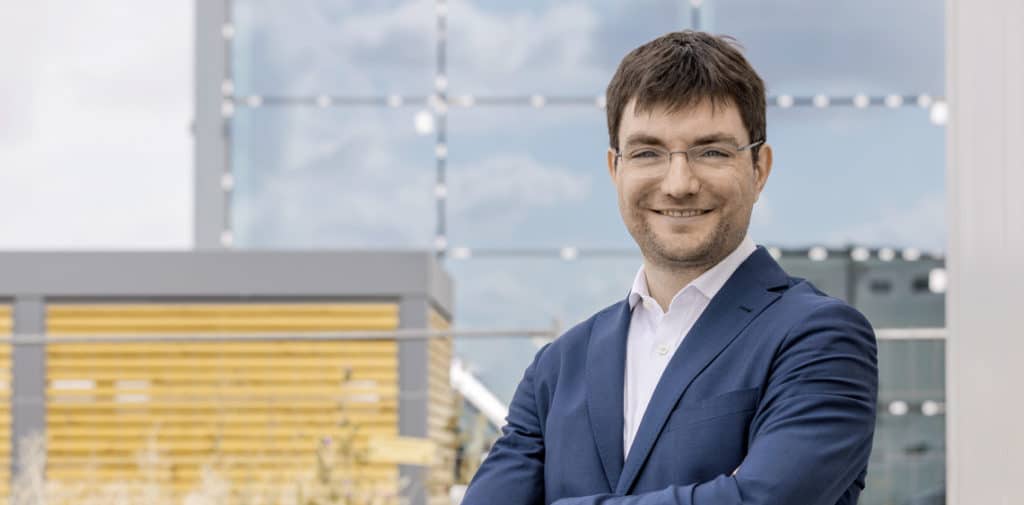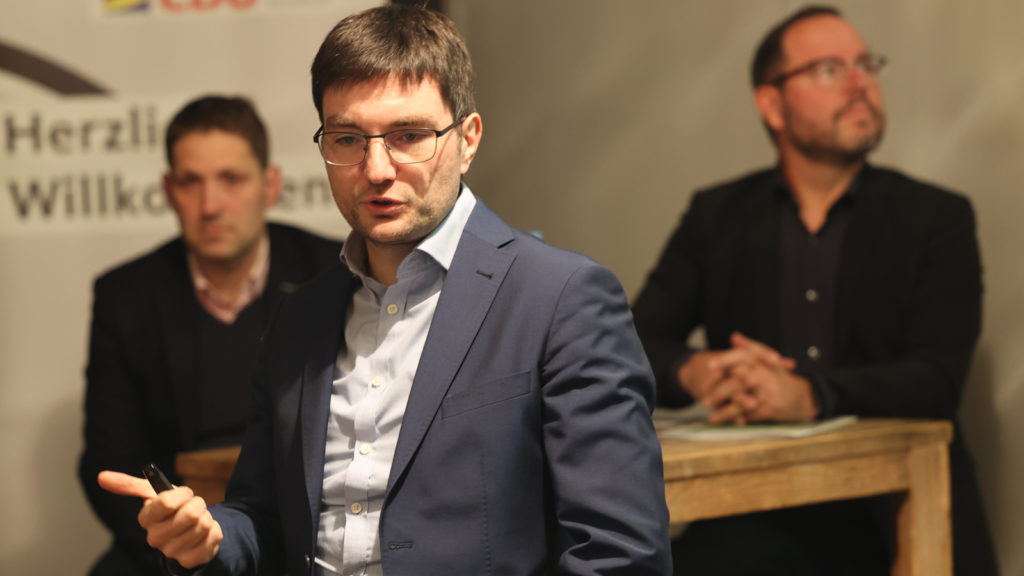No Either-Or Situation in the Energy System of the Future

Prof. Andreas Peschel. Photo: Forschungszentrum Jülich/Limbach
“We will see electricity and hydrogen in the environmentally friendly energy system of the future. It won’t be an either-or situation,” summarized Prof. Dr. Andreas Peschel, who was speaking to members of the Eschweiler town association of the Christian Democratic Union (CDU) party.
Andreas Peschel is director at the Institute for a Sustainable Hydrogen Economy (INW) at Forschungszentrum Jülich. He and Fabian Müller-Lutz, a hydrogen expert from the Aachen Chamber of Industry and Commerce (IHK), had been invited to Eschweiler to speak to the local CDU party about the future of energy.
“We need hydrogen whenever there is not enough electricity,” said Peschel. Green electricity and its short- and medium-term storage systems such as batteries are more suitable than hydrogen in many areas, as they offer a more inexpensive and efficient means of supply, he added. “But energy is often not consumed in the places where it is generated,” explained Peschel, explaining that the transport and storage of large quantities of energy are important issues.
This is particularly true for a country like Germany, and even more so for an energy-intensive federal state such as North Rhine-Westphalia (NRW) where more energy is required than is produced, according to Peschel. Hydrogen is intended to close the gaps that electricity cannot cover or can only cover to a limited extent. This includes scenarios such as transport over longer distances, storage over longer periods of time, a high energy demand, or the need to work at very high temperatures, for example in the steel industry.
We need hydrogen whenever there is not enough electricity.
Prof. Andreas Peschel
Mixed calculation for the energy price
When asked by one of the audience members whether energy produced from hydrogen would be too expensive, Peschel responded: “We need to be honest with ourselves and say that in the next few years, hydrogen will not be in the same price range as fossil fuels such as lignite currently are.” Hydrogen will be two to four times more expensive in the medium term before prices start to fall in the long term. Peschel stressed that hydrogen alone will not determine the energy price of the future. He spoke instead of a mixed calculation, which will be largely determined by green energy directly converted into electricity.
“Green electricity is already the most inexpensive form of energy that can be expanded,” said the director of the INW subinstitute. Expansion in this context refers to newly created capacities. New wind turbines or photovoltaic fields are less expensive to build than new nuclear or coal-fired power plants. This is highlighted by the example of the US state of Texas where there has been a massive expansion of renewable energy, said Peschel. “The Texans are not doing this because they want to do something for the global climate, but because green electricity is extremely cheap for them,” Peschel explained. The kind of opportunities seen in Texas do not exist in Germany due to the lack of available land and the lower intensity of the sun, he added.
No alternative to the renewable energy path
The transition towards a green electricity supply means that there will be temporarily higher costs for Germany, Peschel said. “The curves will begin to slope downward as expansion progresses. But we’re not quite there yet,” he said, referring to the prices. Despite this, there is no alternative to the renewable energy path and it is the right course of action, Peschel added. “What else are we supposed to do? Keep burning coal and oil and say to future generations: You deal with the consequences,” said Peschel, posing a rhetorical question.
Peschel went on to state that the core of the Rhenish mining area, which includes the municipality of Eschweiler, is very willing to tackle the issues of the energy transition and structural change. “There is no mentality of complaining here. We are speaking to a lot of companies and finding that there is a real willingness for innovation.”
A more pragmatic approach to funding programmes
This was backed up by Fabian Müller-Lutz, who coordinates the Hydrogen Hub Aachen on behalf of IHK Aachen. Hydrogen Hub Aachen is a joint hydrogen initiative of the towns and districts in the IHK Aachen region. “We want to transform a large energy system. But there are a number of challenges to contend with. However, many people are helping to ensure its overall success,” explained Müller-Lutz. More pragmatism is needed to overcome the challenges, said Müller-Lutz. For instance, funding programmes designed to help implement the energy transition are often difficult for small and medium-sized enterprises (SMEs) to access. This needs to be improved, he added.
More connections to the core network
The same is true for the German Federal Government’s current planning of the hydrogen core network. The distribution infrastructure for hydrogen has been designed in such a way that large-scale consumers from certain industrial sectors will be supplied first, said Müller-Lutz. “We believe it would be negligent to not connect other industries at first.” Although one of the main supply lines will also run through the district of Düren,
an exit point for hydrogen is not currently planned there, he explained. This means that there will be no hydrogen from the core network for the district of Düren as things currently stand. The districts of Heinsberg and Euskirchen have also been left out. SMEs are also affected by the preference shown for large-scale customers, Müller-Lutz added. “If we want to decarbonize, then we will need our SMEs. These enterprises can build the systems that we need for the hydrogen ecosystem.”
Promoting innovation
Generating new economic power through hydrogen is one of the aims of the Helmholtz hydrogen cluster (HC-H2), a collaboration between INW and partners from industry, business, and other public institutions. According to Peschel, the experts from Forschungszentrum Jülich are unable to offer energy consulting as part of HC-H2, but they can help partners to ensure projects meet the necessary qualification criteria and bring them in line with the funding guidelines. Moreover, a considerable portion of the more than € 1 billion in funding for HC-H2 is to be channelled into the partner companies by 2038. The prerequisite for this is that the partners help to establish innovative hydrogen technologies on the market quicker. To this end, HC-H2 is not promoting the economy, but rather innovation that will in turn provide new economic power.


